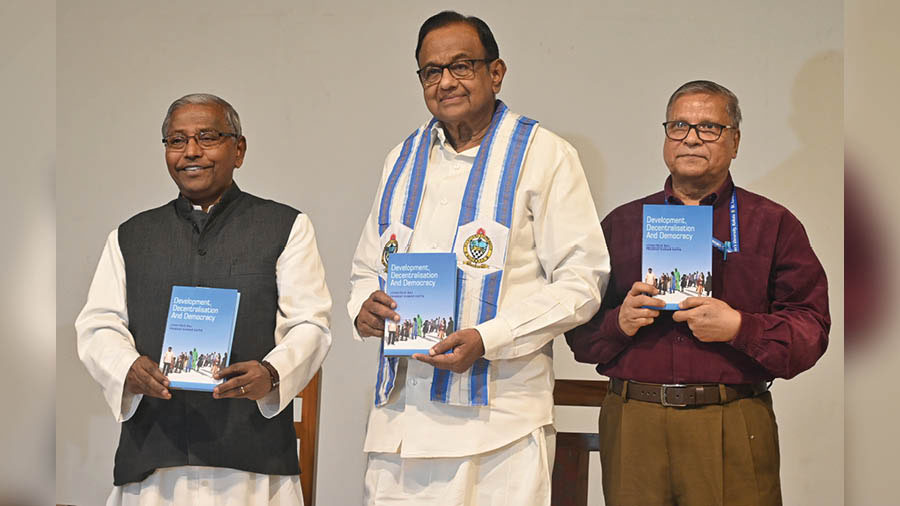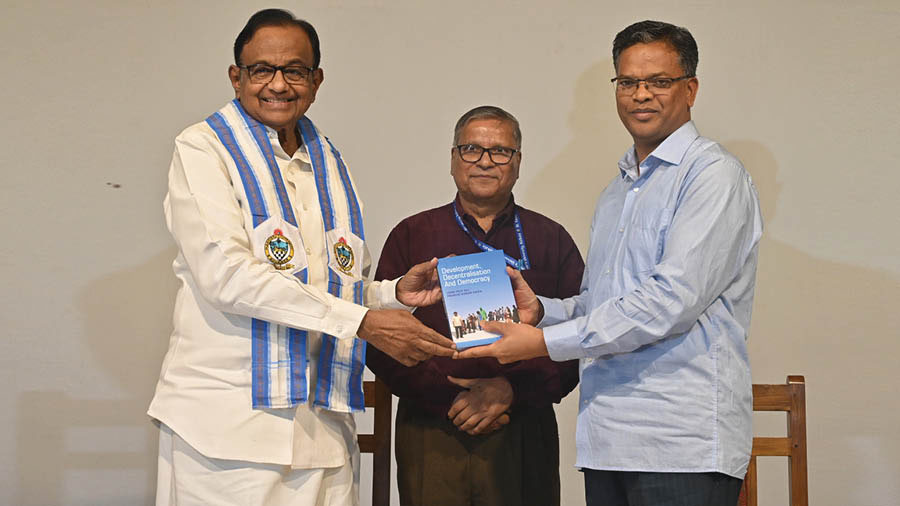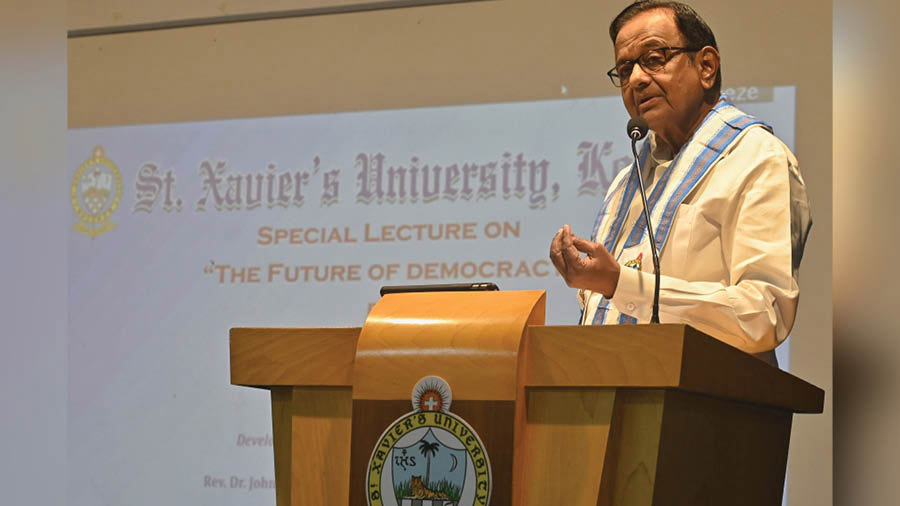India is the world’s largest democracy. It is also the world’s most unique democracy. Rajya Sabha MP and former Union minister of finance P. Chidambaram elucidated the way Indian democracy has changed in recent years in a special lecture on ‘The Future of Democracy’ at St Xavier’s University on November 25. The event coincided with the launch of Development, Decentralisation and Democracy, a book authored by the varsity’s vice-chancellor, Father John Felix Raj, and Prof Dr Prabhat Kumar Datta. My Kolkata was there.
Starting off, the minister said that Abraham Lincoln’s definition of democracy being, “Of the people, by the people, for the people” is outdated in an age where countries have elections with all opposition leaders in prison, or candidates from just one party. He also pointed out how the one-person-one-vote had been trifled with, as people had been historically disenfranchised. Many groups of people initially couldn’t register as voters or afford to travel to distant polling stations. When they could, their names either weren't on the electoral rolls or they were prevented from voting.
“Our Constitution makers were following the Westminster model, where the Prime Minister is accountable every minute of every day, the judiciary is independent, and the press is free. In the years since them, these basic principles have been eroded and forgotten. The fundamental message I wish to convey is that, over the years, democracy has been hollowed out in the country. The facade is appealing but it is hollow from the inside,” said Chidambaram. He attributed this hollowness to several factors, starting with money.

The book was launched in the presence of (left) St Xavier’s University vice-chancellor Father Felix Raj, and (right) Prof Dr Prabhat Kumar Datta. “I want to thank P. Chidambaram for accepting our invitation and being here exclusively for us. He not only visited our campus, but spent time with the Jesuits, being the alumnus of a Jesuit institution himself,” said Raj
“Once, a mere Rs 5,000 was enough to elect an MLA. Earlier this month, 1,760 crore rupees of unaccounted money were sized, intended to be used in elections. Money is the most determinant factor in elections today,” he sighed, adding that an average rally costs upwards of a crore, contrasting it with how, during his first election, he printed a few thousand posters and went campaigning from village to village in a truck. “Today’s rallies are glitzy shows, with hundreds of trucks bringing people with the promise of food, drinks, entertainment and money.”
Chidambaram named religion as the second cause of hollowness, stating that people should vote as citizens, and not members of a particular faith. “A political party has consistently refused to nominate any non-Hindu candidates, despite Muslim populations constituting 20% in some states. A Member of Parliament from Madhya Pradesh even said that the basic structure of this country before 1192 was ‘Akhand Hindu Rashtra’. I fail to understand why 1192 is relevant today.”
His third gripe was with the undermining of institutions that are integral towards supporting democracy. Chidambaram argued that democracy was about returning power to the people, but the current atmosphere was moving towards centrism. He cited the New Education Policy as a prime example, where states were being robbed of their right to administer education, with the appointment of vice chancellors of state-run universities requiring central approval. “The one-ness of India, where one language, food and culture are being imposed is not democratic. You can’t have one language for India, because it is only one language for Hindi-speaking states. For Hindi-knowing states, it is two languages, and for those that don’t speak Hindi, it is three.” He also reminisced how, despite studying in a Christian school, students has the choice to opt for moral science classes or Bible classes. “Most students were Hindu and yet, they opted for Bible classes of their own volition.”

The first copy of the book was presented to (right) Reverend Dr James Arjen Tete, S.J, chancellor of SKU. “The road to development and democracy is bumpy and full of potholes, which leads to the car moving slowly and halting. The drivers are hesitant and reluctant, leading to where we are today. In the book, we analytically review the past and suggest corrective measures to be applied,” said Datta
Chidambaram further called out the rampant culture of unseating governments, where governments are collapsing because of last-minute defections. He pointed fingers towards the lax approach regarding law and order, stating that a democracy is flawed if any citizen has to ask the Supreme Court for their right to live without fear.
The politician concluded his session with some hard-hitting statistics about the country’s fall in rankings between 2014 and 2022, drawing sharp attention towards the disproportionate distribution of wealth. “True democracy is like the high tide. It must give life to all boats. Unfortunately for India, while our ultimate result may be democratic, our elections aren’t. If the process is corrupted, so is the result.”
After his speech, a student from SXU shared that he too had the desire to help uplift the country, but felt helpless after looking at the state of things. Chidambaram smiled and said, “As a student, the greatest thing you can do is acquire knowledge. It will give you the tools to inflict change within your community.”
